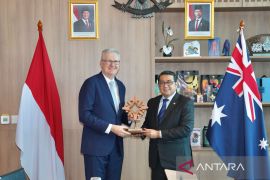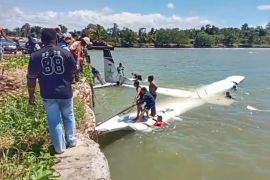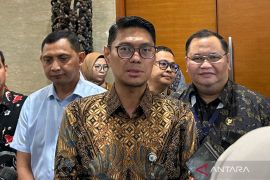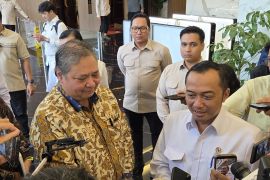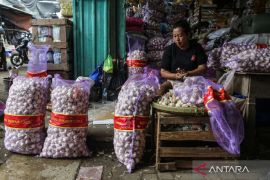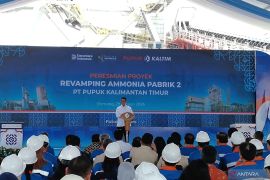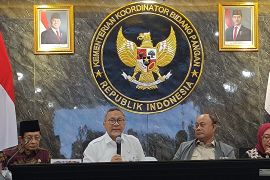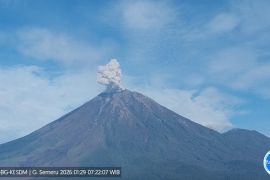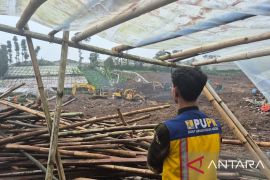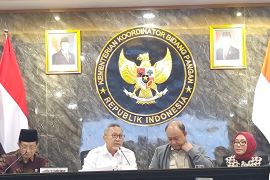"The foreign tourists, who usually come to dive and surf in the waters of Komodo National Park, acknowledged that instead of the beautiful underwater scenery, they had encountered plastic wastes," East Nusa Tenggara ASITA Chairman, Abed Frans, said.Jakarta (ANTARA News) - Efforts to improve security of Komodo National Park tourist area in West Manggarai District, East Nusa Tenggara Province, will continue to be made to address the issues of poaching, illegal fishing, and waste management.
In a bid to maintain security at Komodo National Park, the Directorate General of Law Enforcement from the Ministry of Environment and Forestry will soon establish a security post in the region.
The national park is home to some of the world`s largest Komodo dragons (Varanus komodoensis), but they are under threat and defined as vulnerable by the International Union for the Conservation of Nature.
Hence, the security post, which is targeted to be completed before the International Monetary Fund - World Bank (IMF-WB) annual meeting in Bali in October 2018, will be established around the Komodo National Park.
The post, according to the park office chief Budi Setiawan, will step up security to prevent animal poaching activities within and around the national tourism spot.
The establishment of the security post is also part of the synergy of the Komodo National Park Office regarding the security scheme and the rebuilding of intelligence functions.
Following the establishment of the security post, the Directorate General of Law Enforcement from the Ministry of Environment and Forestry will provide a speedboat to monitor illegal fishing activities in the waters around Komodo Island.
The support in the form of protection activities, security, and handling of waste in the tourist area, known as the habitat of ancient Komodo dragons, will also continue to be improved.
The Komodo National Park is a popular tourist destination, and therefore, the lawlessness, waste, and poaching activities have become negative issues that discourage tourists.
Hence, the security of the park, as one of the seven wonders of the world (new 7 wonders), remains a top priority.
So far, continuous integrated float patrols, involving the Navy and Water Police in West Manggarai, have been continuously conducted.
These routine patrols are carried out in water and land that are prone to disturbances such as illegal harvesting of seafood, illegal hunting, or disruption by visitors` activities.
Regarding offering security to tourism boats, some 10 boat mooring facilities have been built to offer docking facilities, with five of them around the Pink Beach area, and the others spread around various points of interest.
The mooring facilities were built so that boats carrying tourists, keen on conducting surfing and diving activities, would not anchor recklessly.
Security around the Komodo National Park will continue to be optimized, so that the world-famous Komodo Island and its surrounding natural beauty would be preserved and would make tourists feel safe and comfortable.
In 2017, more than 120 thousand tourists, comprising 65 percent foreign holidaymakers, had visited Komodo Island.
In addition, serious efforts must also be taken to overcome the problem of waste at the Komodo National Park, after complaints from foreign tourists.
The tourists stated that based on their experience of diving in the waters of the Komodo National Park in the previous years, they have found the current situation to be bad due to pollution by waste.
East Nusa Tenggara Association of Indonesian Tours and Travel Agencies (ASITA) Chairman, Abed Frans, argued that the issue of plastic waste, which has not been resolved at the Komodo National Park, is now in the spotlight of UNESCO.
Frans noted that in the East Nusa Tenggara provincial capital of Kupang, the plastic waste problem, complained by foreign tourists in the national park, has become the spotlight of UNESCO as it has not yet been fully resolved.
"The foreign tourists, who usually come to dive and surf in the waters of Komodo National Park, acknowledged that instead of the beautiful underwater scenery, they had encountered plastic wastes that cause destruction to the underwater ecosystems," Frans remarked.
Hence, the local government and related authorities must carry out various efforts to address the problem of plastic waste and the damages caused to the marine ecosystems in the tourist area.
Frans called for intensive supervision of the water bodies, as well as the application of strict rules against the activities of fishermen, which are not environmentally friendly.
"This plastic waste problem is no longer a trivial matter as it has come under the spotlight of UNESCO. If it is resolved immediately, foreign tourists will be attracted to the dive and surfing locations other than the Komodo National Park," Frans noted.
He asserted that ASITA, as part of the tourist actors, is ready to assist the relevant authorities for handling waste problems at Komodo National Park.
"Through our representatives in West Manggarai, and together with local tour guide groups, we are ready to assist in handling this plastic waste problem," he asserted.
Frans expressed hope that the handling of plastic waste, which is also fully supported by the central government, will be completed as soon as possible.
It is now time for the Government of Indonesia to work towards changing community behavior in its efforts to solve the problem of plastic waste that leads to land and sea pollution.
If no significant change is made, it is feared that the ratio of plastic to fish in the oceans would reach three is to one by 2025, and the oceans would contain more plastic waste than fish by 2050.
However, the successful reduction of plastic waste in sea and on land, as part of the climate change control measures, is deemed quite dependent on the changes in community behavior.
(o001/INE)
(T.O001/A/KR-BSR/A014)
Reporter: Otniel Tamindael
Editor: Heru Purwanto
Copyright © ANTARA 2018
